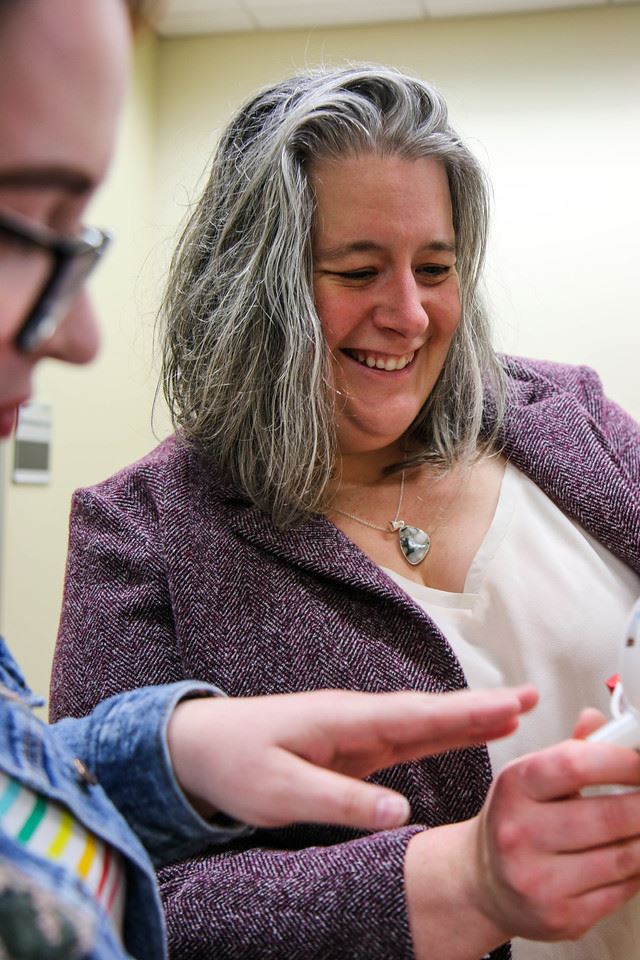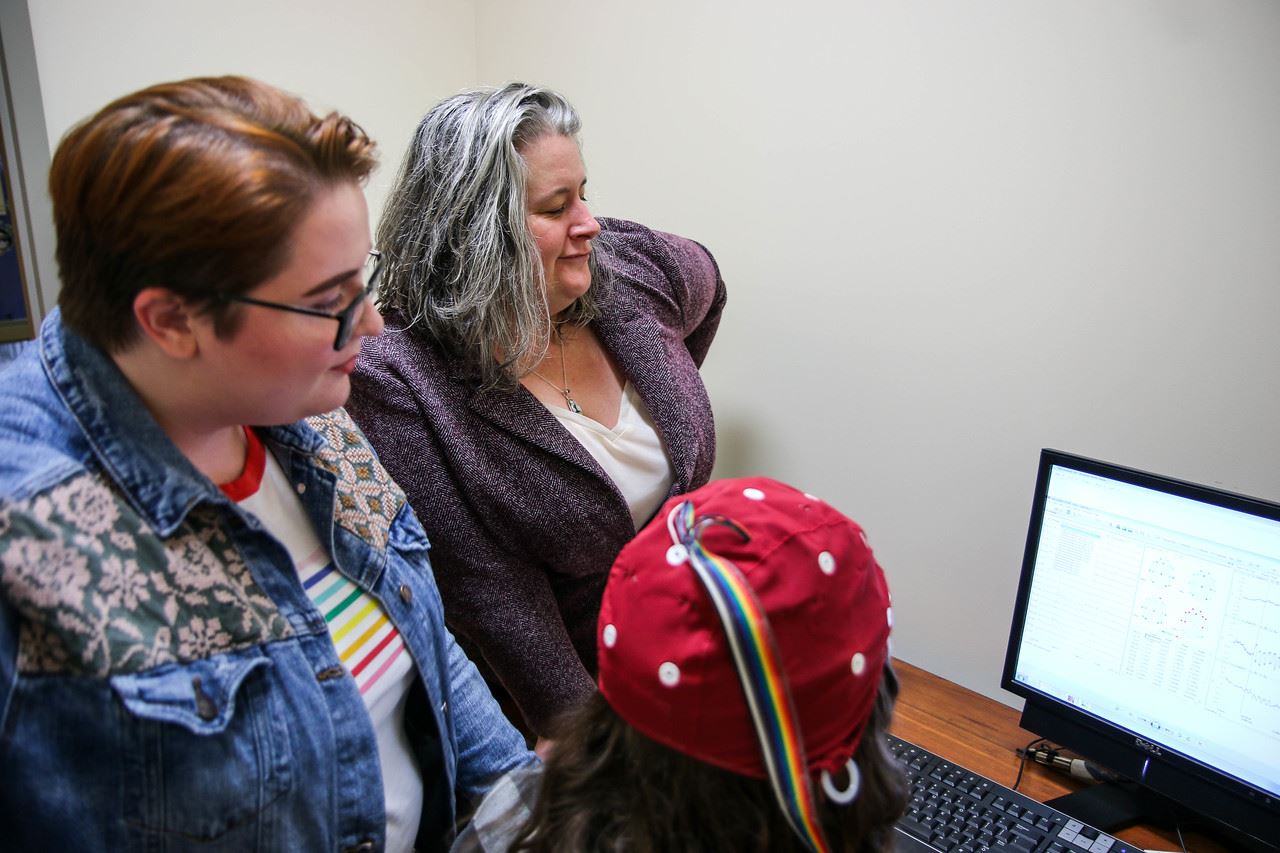 School name: University of Wisconsin-Superior
School name: University of Wisconsin-Superior
Type of school: Four-year public liberal arts college
School locale (including state and country): Superior, WI, USA
How many years have you taught psychology? 12 years full time
Classes you teach: Reading and Writing for Psychology; Senior Research; Learning and Behavior; Psychopharmacology; Psycholinguistics; General Psychology
Specialization (if applicable): Cognitive
Average class size: 25
What’s the best advice about teaching you’ve ever received? Remember that you are always the adult in the room.
What book or article has shaped your work as a psychology teacher? Schwartz, M. A. (2008). The importance of stupidity in scientific research. Journal of Cell Science, 121, 1771.
Briefly tell us about your favorite lecture topic or course to teach. I honestly love all of classes (there are no clunkers)--but the one that has become a passion is Reading and Writing for Psychology. There is so much embedded in that course that is foundational to academic (and professional success): information literacy, critical reading, explaining complex concepts, and at its core is the message of continuous improvement and the need for constant revision. It is also a great chance to invite students into your own areas of growth as a scholar and normalize them; my students are often shocked that even professors need multiple drafts and feel frustrated and procrastinate-y. That course is both a skill builder and an invitation to the constant struggle of reading for comprehension, writing, and revising.
Briefly describe a favorite assignment or in-class activity. I really enjoy teaching my students to concept map and how to annotate figures (Hoskins, 2008). Concept mapping helps my students see two things: 1.) How much they actually know about at topic and 2.) How all of their knowledge fits together. It’s constructivist learning at its finest!
 What teaching and learning techniques work best for you? I really enjoy using the C.R.E.A.T.E (Consider, Read, Elucidate the hypothesis, Analyze and interpret the data, Think of the next Experiment) method in my content classes (Hoskins, 2008). Because it is an active learning approach that focuses on teaching how to think like scientists, it’s successful in a wide range of classes (from Psyc 101 to 400-level classes like Psycholinguistics). I also use this approach in my Reading and Writing Course because it helps my students learn active reading and analysis that’s critical for close reading of scholarly articles. C.R.E.A.T.E is also great because it remedies one thing that was missing from my undergrad psychology degree: how to read scholarly articles effectively.
What teaching and learning techniques work best for you? I really enjoy using the C.R.E.A.T.E (Consider, Read, Elucidate the hypothesis, Analyze and interpret the data, Think of the next Experiment) method in my content classes (Hoskins, 2008). Because it is an active learning approach that focuses on teaching how to think like scientists, it’s successful in a wide range of classes (from Psyc 101 to 400-level classes like Psycholinguistics). I also use this approach in my Reading and Writing Course because it helps my students learn active reading and analysis that’s critical for close reading of scholarly articles. C.R.E.A.T.E is also great because it remedies one thing that was missing from my undergrad psychology degree: how to read scholarly articles effectively.
Hoskins, S. (2008). Using a paradigm shift to teach neurobiology and the nature of science—A C.R.E.A.T.E-based approach. Journal of Undergraduate Neuroscience Education, 6(2), A40-A52.
What’s your workspace like? Like a filing cabinet exploded.
Three words that best describe your teaching style. Adaptive, informal, rigorous
What is your teaching philosophy in 8 words or fewer? Foster growth through curiosity, skepticism, literacy, and confidence.
Tell us about a teaching disaster (or embarrassment) you’ve had and how you dealt with the situation. In my first semester of full-time teaching, I realized that my tights didn’t fit as well as I thought and were falling off. I stepped behind the desk at the front of the classroom, kicked them off, and kept lecturing. If my students noticed they took mercy and didn’t say anything!
What about teaching do you find most enjoyable? Everything but the grading! Mostly I enjoy the relationships with students and watching them see how much they are learning and gaining skills.
What is something your students would be surprised to learn about you? I think my students would be surprised that one of my summer jobs in college was being a camp counselor at a sleep away camp or maybe that I have never had a cup of coffee.
What are you currently reading for pleasure? Kimmerer, R.W. (2013). Braiding sweetgrass. Milkweed Editions.
What tech tool could you not live without? I tend towards the low-tech side of things—but I love speed grader on Canvas! My bad handwriting doesn’t cause an issue and I can’t spill tea on that homework.
What is your hallway chatter like? What do you talk to colleagues about most (whether or not it is related to teaching/school)? It’s been a bit since we all had a hallway to chatter in—but a lot is about classes and university politics/drama. We also get in a fair amount of talk about pets, food, and life in general.
Has your teaching changed because of the Covid19 pandemic? If so, how? (positive and/or negative changes) On the positive side, I’ve gotten a lot better at organizing my materials within our learning management system. On the negative side, I feel more disconnected from my students, and I’ve found it hard to foster mentoring relationships at a distance. I hope to continue developing my virtual mentoring skills as more students choose online learning options.
